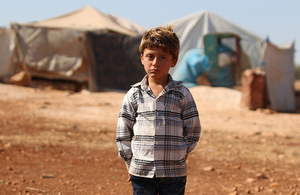UK warns Asad against “man-made catastrophe” in Idlib as new UK aid package announced for north-west Syria
The UK is scaling up support to meet emergency humanitarian needs in face of the threat of imminent military offensive by Asad regime and Russia.

An internally displaced boy stands near his temporary shelter in rural Idlib, Syrian, August 2018. Picture: UNICEF/Amer Al Shami
The UK is scaling up its support in north-west Syria to meet emergency humanitarian needs in the face of threats of an imminent military offensive by the Asad regime and Russia. In the last week alone, there have been reports of airstrikes against four medical facilities in north-west Syria.
The Syria crisis, now in its eighth year, has left over 400,000 dead and forced half of Syria’s population to flee their homes.
Minister for the Middle East Alistair Burt said:
I am deeply concerned by the escalating military action in Idlib, including reported attacks on a number of hospitals and clinics. In the last couple of years, the Syrian regime and its Russian backers have repeatedly hidden behind the rationale of confronting terrorism to launch brutal, indiscriminate campaigns, killing countless children and civilians in the process. If they do the same in Idlib, they will cause a human disaster that could leave thousands dead and many more homeless.
The UK has been clear that a man-made catastrophe in Idlib is entirely avoidable. We support the urgent diplomatic efforts being made by Turkey and the UN. The Syrian regime and its supporters, Russia and Iran, must uphold the ceasefire they have previously agreed and respect international humanitarian law.
The situation for the three million people in Idlib is already very difficult and risks becoming much worse. Half of those people have already had to flee from elsewhere in Syria, and the last few days have seen thousands more people leave their homes. Today’s UK aid package will save lives by helping to prevent the spread of deadly disease and provide shelter for those that have had to leave everything behind.
The package, from the UK Department for International Development, will support over a quarter of a million people in north-west Syria. Delivered by UN agencies, NGOs and local organisations, it aims to:
- provide clean water and sanitation for some of the most vulnerable families that have had to flee their homes;
- support doctors and nurses that are tackling the spread of deadly diseases and treating those with trauma injuries;
- give shelter to those that have been displaced by the conflict; and
- provide mental health services to children and adults that have lived through the horrors of war.
Since the crisis started, the UK is the second largest humanitarian donor to the response inside Syria and has committed £2.71 billion since 2012, our largest ever response to a single humanitarian crisis.
Today’s package is in addition to the UK’s existing humanitarian assistance in north-west Syria. During the previous financial year, our support in Idlib Governorate has provided 654,000 people with access to clean drinking water, immunised nearly a million children under the age of five and helped over 300,000 children access education.
Notes to editors
- The UK’s Department for International Development UK is providing £32 million of additional aid to meet emergency needs in Idlib and the surrounding areas.
- £17 million will support emergency preparedness, provided by NGOs and UN agencies, including UNICEF, WHO and UNFPA.
- The remaining £15m will go to the United Nations Office for the Coordination of Humanitarian Affairs (UN OCHA) Turkey Humanitarian Fund to meet emergency needs in north-west Syria.
ENDS
General media queries (24 hours)
Email mediateam@dfid.gov.uk
Telephone 020 7023 0600
If you have an urgent media query, please email the DFID Media Team on mediateam@dfid.gov.uk in the first instance and we will respond as soon as possible.